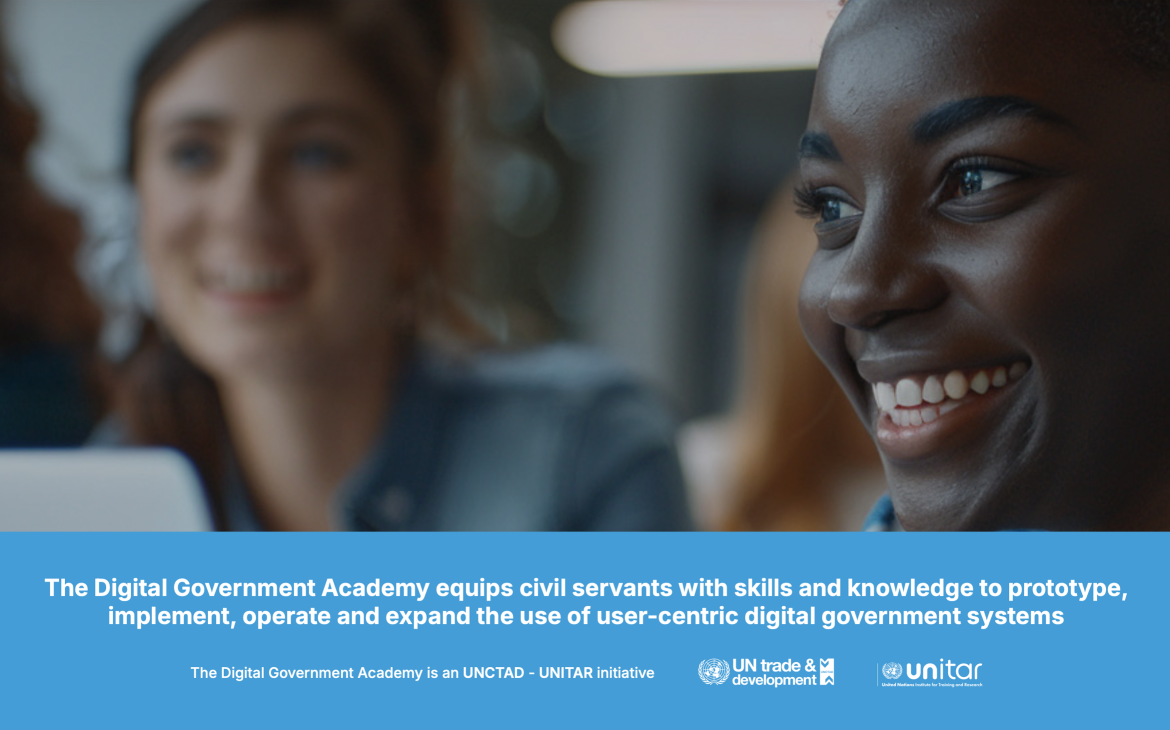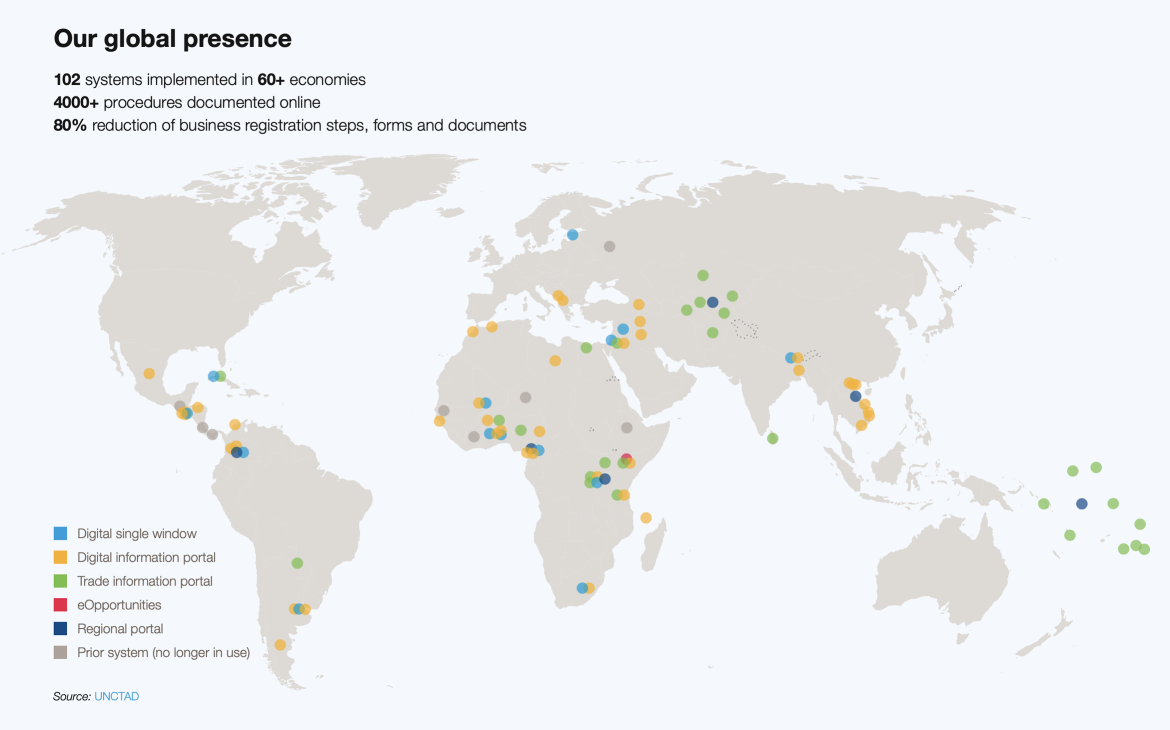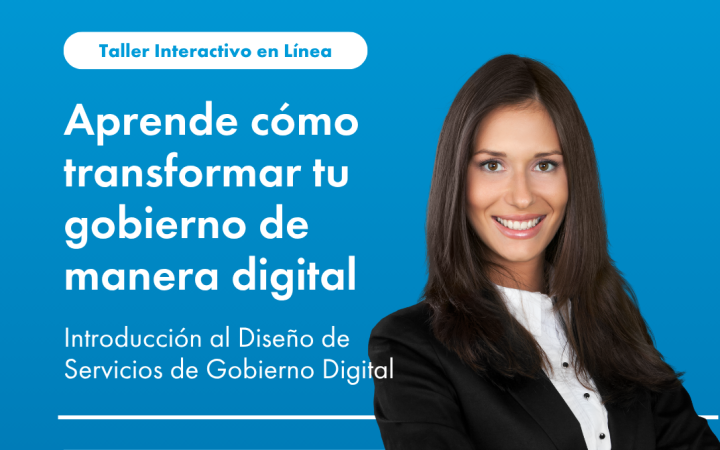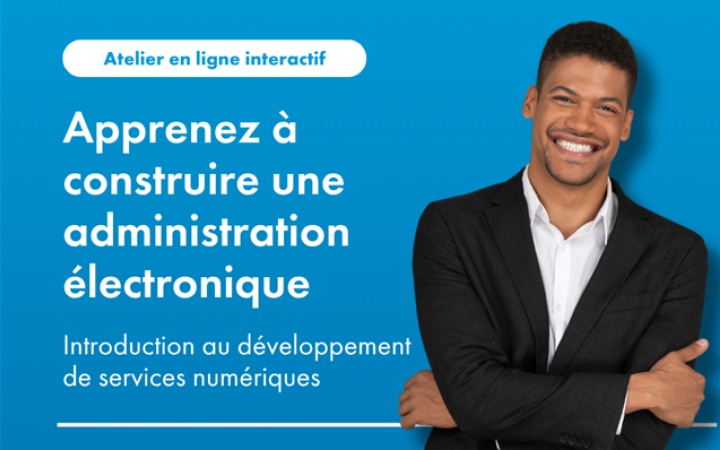OUR MISSION
To bridge the digital divide and foster a more efficient, responsive, transparent, and citizen-friendly government by providing comprehensive training that enables civil servants to build and manage digital platforms providing services without the need for IT programming skills using a no-code development platform.
BACKGROUND
In 2005, UN Trade and Development (UNCTAD) created the Business Facilitation Programme offering a series of tools and participative methodologies to improve the enabling environment for business by streamlining administrative processes and mobilizing technology through digital platforms. So far, more than 40 countries are using the tools and methodologies, operating more than 70 user centered open-source digital government systems such as eRegulations, Trade Portal and eRegistrations.
The Business Facilitation Programme expanded and became the UNCTAD Digital Government Programme to respond to ever increasing demand for technical assistance to digitize government services.
To meet the corresponding increasing demand for capacity building in the area, UNCTAD partnered with UNITAR through its Division for People, given its mandate as the UN agency aiming “to develop the individual, institutional and organizational capacities of countries and other UN stakeholders through learning solutions for enhancing decision-making and support country-level action towards overcoming global challenges”. The UN Digital Government Academy (DGA) is the result of this partnership.
Through the DGA, partners work to build more equal, inclusive, and prosperous societies by promoting good governance. Improving government services and facilitating administrative procedures bring significant benefits for different actors by fostering economic growth through a more transparent business environment, enhancing the formalization of businesses, combating corruption, and supporting job creation. The impact of mainstreaming knowledge in this regard is a powerful resource to enhance capabilities while sharing good practices towards a culture of learning.
TARGET AUDIENCE
The Digital Government Academy equips civil servants with the skills and knowledge needed to prototype, implement, operate and expand the use of user-centric digital government systems.
PARTNERSHIPS
The DGA’s team responds to requests from national, provincial, and municipal authorities to implement Digital Government Projects. The DGA works with Governments and partners with International Organizations and other UN entities, civil society, and the private sector:
1. Governments at different levels
The Digital Government Academy equips civil servants with the skills and knowledge needed to prototype, implement, operate and expand the use of user-centric digital government systems. The team works with government representatives to design prototypes collaboratively before moving on to support the implementation of the digital systems, providing training on conceptualizing, developing and managing digital platforms at each stage of the project.
2. Private sector especially Small and Medium Enterprises
One of the main goals of the DGA is to improve on government services that enable small and medium enterprises to grow (formalize, access government support services, comply, fast-track operations, engage in international trade, etc.) and that reduce the administrative burden cost of implementing their operations.
Digital services improve on the business climate by enhancing transparency and predictability and reducing the likelihood of corruption, strengthening the ability of private sector players to live up to their social responsibility.
3. Civil society, including Non-Governmental Organizations
Digital platforms may benefit civil society by enhancing and expanding access to improved and better adapted services impacting social welfare and cohesion.
4. Donor governments
Partnering with the DGA enables donor governments, through international cooperation, to support national reforms, the modernization of partner countries’ economies, and create the conditions for lasting and meaningful positive change.
5. International Organizations
Under the respective competencies of a wide variety of International Organizations, this Programme can offer innovative solutions to achieve SDGs and other common goals.
HOW CAN YOU SUPPORT THE DGA’S ENDEAVOR?
- Be part of our trainings to become an expert on Digital Government
- Learn through other material available at this webpage
- Share with others what you have learned
- Join us as a partner -donor or recipient country
- Send us your suggestions!
Bénin. Projet guichet électronique de l’investissement.
Burundi. Projet guichet électronique de création d’entreprise.
Cameroun. Projet guichet électronique de création d’entreprise.
Colombia. Mandatory Emissions Registry (ROE)
Kenya. Kenya Investment Single Window.
Libya. eRegulations and eRegistrations project.
Mali. Projet mise sur le marché des médicaments.
PAST EVENTS
Interactive Online Workshop - Learn How to Digitally Transform Your Government
- Date: 15 May 2025
- Language: English
- Video recording: here
Taller Interactivo en Línea: Aprende cómo transformar tu gobierno de manera digital
- Date: 15 May 2025
- Language: Spanish
- Video recording: here
Atelier en ligne interactif - Apprenez à construire une administration électronique
- Date: 13 June 2025
- Language: French
- Video Recording: here
Are you eager to learn more about the DGA? Visit: Digital Government World - Digital Government Academy
CONTACT
Are you interested in exploring possible synergies with the Digital Government Academy? Contact us!
Mr. Kjartan Sorensen, Senior Programme Specialist, kjartan.sorensen@unitar.org and Mme. Analucía Jácome, Senior Project Leader and Human Rights Expert, SDP, Division for People and Social Inclusion, UNITAR, at analucia.jacome@unitar.org






